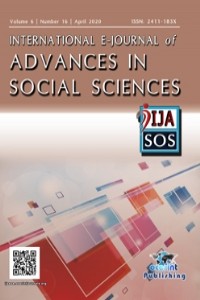Abstract
References
- Ugbudian, L. I. (2015). 2015 General Elections In Nigeria: The Role Of Abuja Peace Accord.Department of History and Strategic Studies, Federal University Ndufu-Alike Ikwo, Ebonyi state.
- Young, I M. 2000. Inclusion and Democracy. Oxford: Oxford University Press.
ELECTORAL SECURITY AND VOTER-TURNOUT IN THE 2019 GUBERNATORIAL ELECTION IN ABIA STATE: INTERROGATING THE NARRATIVES
Abstract
Electoral security has serious implications on the survival of democracies, because security is a significant part of an election management process as it influences the level of political participation among the electorates, either during campaign rallies, and coming out to vote on election days. Voter turnout is seen as an important indicator of the state of health of any democracy, old or new, consolidated or in transition. Apart from this, voting is the most important form of political participation especially on Election Day. In Nigeria, there have also been allegations of complicity by incumbents, politicians and security operatives in facilitating electoral fraud during elections as these have affected the level of political participation in terms of voter turnout. This paper examined the intertwining influence of electoral security and voters’ turnout in the 2019 gubernatorial election in Abia State of Nigeria. Anchoring our discourse on the theory of the postcolonial state which sees the Nigerian state as privatized and used only as an instrument for primitive accumulation, with data drawn from both primary and secondary sources, and a qualitative descriptive method of analysis, findings revealed that; voter were inaccurate as this was manipulated to favour the incumbent. Also, there was a low turnout of voters during the 2019 gubernatorial election in Abia state as a result of massive deployment of political thugs and coercive instrument of the state (security agents) with the clear intention of rigging the election. This move created fear among the voters who felt that the whole electoral process was flawed. The paper recommends amongst others that; there is need to carry out electoral reforms for effective guarantee of security of the electoral process as this will in turn encourage high voters’ turnout in subsequent elections in Abia State.
Keywords
Electoral security, electoral violence, post-colonial state, voter register, voter- turnout,
References
- Ugbudian, L. I. (2015). 2015 General Elections In Nigeria: The Role Of Abuja Peace Accord.Department of History and Strategic Studies, Federal University Ndufu-Alike Ikwo, Ebonyi state.
- Young, I M. 2000. Inclusion and Democracy. Oxford: Oxford University Press.
Details
| Primary Language | English |
|---|---|
| Journal Section | Articles |
| Authors | |
| Publication Date | September 10, 2020 |
| Submission Date | April 5, 2020 |
| Published in Issue | Year 2020Volume: 6 Issue: 16 |
Contact: ijasosjournal@hotmail.com
The IJASOS Journal's site and its metadata are licensed under CC BY
Published and Sponsored by OCERINT International © 2015- 2025


